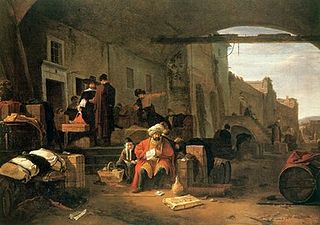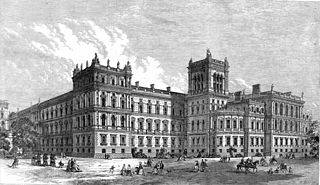William Effingham Lawrence (1781–1841) [1] was an English colonist to Australia, the son of Captain Effingham Lawrence, a merchant with houses in London, Liverpool and New York City. Previous generations of Lawrences had settled in the American colonies but returned to England after the War of Independence. Lawrence was an educated and refined man, an intimate of Jeremy Bentham, who was obliged to migrate to the colony of Van Diemen’s Land due to poor health. On his leaving England Bentham wrote to a friend in Rio de Janeiro: ‘Our excellent friend on his way to Australia is not without thoughts of touching at Rio de Janeiro: a worthier man, a more benevolent cosmopolite, never left any country; and very few better informed or more intelligent’. [1]

England is a country that is part of the United Kingdom. It shares land borders with Wales to the west and Scotland to the north-northwest. The Irish Sea lies west of England and the Celtic Sea lies to the southwest. England is separated from continental Europe by the North Sea to the east and the English Channel to the south. The country covers five-eighths of the island of Great Britain, which lies in the North Atlantic, and includes over 100 smaller islands, such as the Isles of Scilly and the Isle of Wight.

Australia, officially the Commonwealth of Australia, is a sovereign country comprising the mainland of the Australian continent, the island of Tasmania and numerous smaller islands. It is the largest country in Oceania and the world's sixth-largest country by total area. The neighbouring countries are Papua New Guinea, Indonesia and East Timor to the north; the Solomon Islands and Vanuatu to the north-east; and New Zealand to the south-east. The population of 25 million is highly urbanised and heavily concentrated on the eastern seaboard. Australia's capital is Canberra, and its largest city is Sydney. The country's other major metropolitan areas are Melbourne, Brisbane, Perth and Adelaide.

A merchant is a person who trades in commodities produced by other people. Historically, a merchant is anyone who is involved in business or trade. Merchants have operated for as long as industry, commerce, and trade have existed. During the 16th-century, in Europe, two different terms for merchants emerged: One term, meerseniers, described local traders such as bakers, grocers, etc.; while a new term, koopman (Dutch: koopman, described merchants who operated on a global stage, importing and exporting goods over vast distances, and offering added-value services such as credit and finance.
He purchased a small cutter, the Lord Liverpool and sailed via South America in 1822. On the way he sailed into Rio de Janeiro for provisions and water. Brazil, a Portuguese colony since the 16th century, was in the midst of a struggle for independence, and Lawrence became personally involved through his friendship with José Bonifácio, the liberal revolutionary and first minister under the new government of Dom Pedro, who had defied his father in Lisbon and declared Brazil independent in 1822. Lawrence was captivated by events and remained for months in the country, becoming a confidant of José Bonifácio, the architect of Brazilian independence. Bonifácio wanted Lawrence to remain in the country permanently, but Lawrence declined, and after several exciting months, sailed on for Van Diemen’s Land.

Rio de Janeiro, or simply Rio, is anchor to the Rio de Janeiro metropolitan area and the second-most populous municipality in Brazil and the sixth-most populous in the Americas. Rio de Janeiro is the capital of the state of Rio de Janeiro, Brazil's third-most populous state. Part of the city has been designated as a World Heritage Site, named "Rio de Janeiro: Carioca Landscapes between the Mountain and the Sea", by UNESCO on 1 July 2012 as a Cultural Landscape.

Brazil, officially the Federative Republic of Brazil, is the largest country in both South America and Latin America. At 8.5 million square kilometers and with over 208 million people, Brazil is the world's fifth-largest country by area and the fifth most populous. Its capital is Brasília, and its most populated city is São Paulo. The federation is composed of the union of the 26 states, the Federal District, and the 5,570 municipalities. It is the largest country to have Portuguese as an official language and the only one in the Americas; it is also one of the most multicultural and ethnically diverse nations, due to over a century of mass immigration from around the world.

Portugal, officially the Portuguese Republic, is a country located mostly on the Iberian Peninsula in southwestern Europe. It is the westernmost sovereign state of mainland Europe, being bordered to the west and south by the Atlantic Ocean and to the north and east by Spain. Its territory also includes the Atlantic archipelagos of the Azores and Madeira, both autonomous regions with their own regional governments.
Lawrence arrived in 1823 and, by order of the Colonial Office was ordered a grant of 4,000 acres (16 km²) with his brother, with a reserve after 5 years of a further 4,000 acres (16 km²). These 8,000 acres (32 km²) of land became the subject of controversy, because the grant was to be exclusive of waste land. In the end, due to the mismanagement of the surveyor general, the grant ended up being some 12,000 acres (49 km²). The colony was small and gossip, jealousy and petty rivalry was rife. When Colonel George Arthur arrived he was informed of the size of the grant, and ordered an inquiry, sending John Helder Wedge to survey the grant.

The Colonial Office was a government department of the Kingdom of Great Britain and later of the United Kingdom, first created to deal with the colonial affairs of British North America but needed also to oversee the increasing number of colonies of the British Empire. Despite its name, the Colonial Office was never responsible for all Britain's Imperial territories; for example protectorates fell under the purview of the Foreign Office, British India was ruled by the East India Company until 1858, whilst the Dominions were later carved out as the Empire matured.

John Helder Wedge was a surveyor, explorer and politician in Van Diemen's Land.
Wedge and Lawrence became friends and Wedge’s niece Anne Wedge married Lawrence’s son Robert William Lawrence in 1832.
Robert William Lawrence (1807–1833), first-born son of William Effingham Lawrence, was born and educated in England. In 1825 he arrived in Van Diemen’s Land (Tasmania). He became acquainted with Sir William Jackson Hooker, the Regius Professor of Botany at the University of Glasgow and later director of the Botanical Gardens at Kew in London, from whose friendship he developed a passion as an amateur botanist, sending many specimens from the Colony to Kew, resulting in Hooker’s "Flora Tasmaniae" in 1860. Lawrence was Tasmania’s first botanist, and introduced Ronald Campbell Gunn to Hooker. The native fuchsia mountain correa was named by Hooker Correa lawrenciana in honour of his young protégé.
Lawrence’s pastoral interests continued throughout the next 20 years and he eventually became one of the largest landowners in the colony. Lawrence was also prominent in the field of education, helping establish a school in the Norfolk Plains, which was not a success. He then formed a committee with Henty and Mulgrave for the formation of a Church of England school in Launceston, but died before the foundation of Launceston Church of England Grammar School.

The Church of England is the established church of England. The Archbishop of Canterbury is the most senior cleric, although the monarch is the supreme governor. The Church of England is also the mother church of the international Anglican Communion. It traces its history to the Christian church recorded as existing in the Roman province of Britain by the third century, and to the 6th-century Gregorian mission to Kent led by Augustine of Canterbury.
Under Governor Sir John Franklin Lawrence was appointed to the Legislative Council and retained his seat until his death in 1841. Of his sons Robert William Lawrence died young in 1833, and the others remained in the colonies, except for Edward Effingham Lawrence, who returned to England to be educated and became a Cornet in the 7th Dragoon Guards in 1856 and taking part in the Austro-Sardinian War (1860-61).

The 7th Dragoon Guards was a cavalry regiment in the British Army, first raised in 1688 as Lord Cavendish's Regiment of Horse. It was renamed as the 7th Dragoon Guards for Princess Charlotte in 1788. It saw service for two centuries, including the First World War, before being amalgamated with the 4th Royal Irish Dragoon Guards, to form the 4th/7th Dragoon Guards in 1922.










